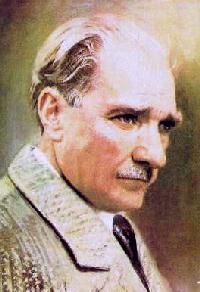At

Atatürk, Mustafa Kemal (1881-1938)
Founder and the first president of the Republic of Turkey. While he an army officer Ataturk joined the Young Turks movement and after the end of the First World War, he withdrew to Anatolia and organised the independence war to liberate Turkey from the occupation of Allied forces. In 1923, the republic was declared and he became the president. Ataturk ruled the Turkey for 15 years and led a westernisation movement and implemented bourgeois reforms, including abolition the Caliphate, separation of Church and state, a reduction of the influence of the Islamic church in social life and the introduction of a western alphabetical writing system. During this time, while introducing measures of Parliamentary democracy, he concentrated most political power in his own hands in order to force through his reform program. He maintained restrictions on the labour movement and did not hesitate to ban opposition parties and suppress ethnic minorities such as the Kurds. Meanwhile, he used the state-industry and public enterprise to promote the development of a capitalist economy and a national bourgeoisie. "Kemalism" was an original path by which undeveloped countries could make the transition from feudalism to capitalism.
Attygalle, Richard C.L. (“Dickie”) (1919– 1963)
Party pseudonym: Rudra
Educated Ceylon University College, with an Honors degreee in English. Joined Lanka Sama Samaja Party, 1939. Active in Bolshevik Leninist Party of India, 1942-50. Member Editorial Board, Fight (Colombo). Taught English at Trinity College, Kandy, and Royal College, Colombo. Worked for UNESCO in Paris, 1951-61. Appointed to the National Education Commission (Ceylon). Visiting lecturer in English, Vidyalankara University. Became an Anglican Christian a few months before his sudden death.,
Compiled by Charles Wesley Ervin